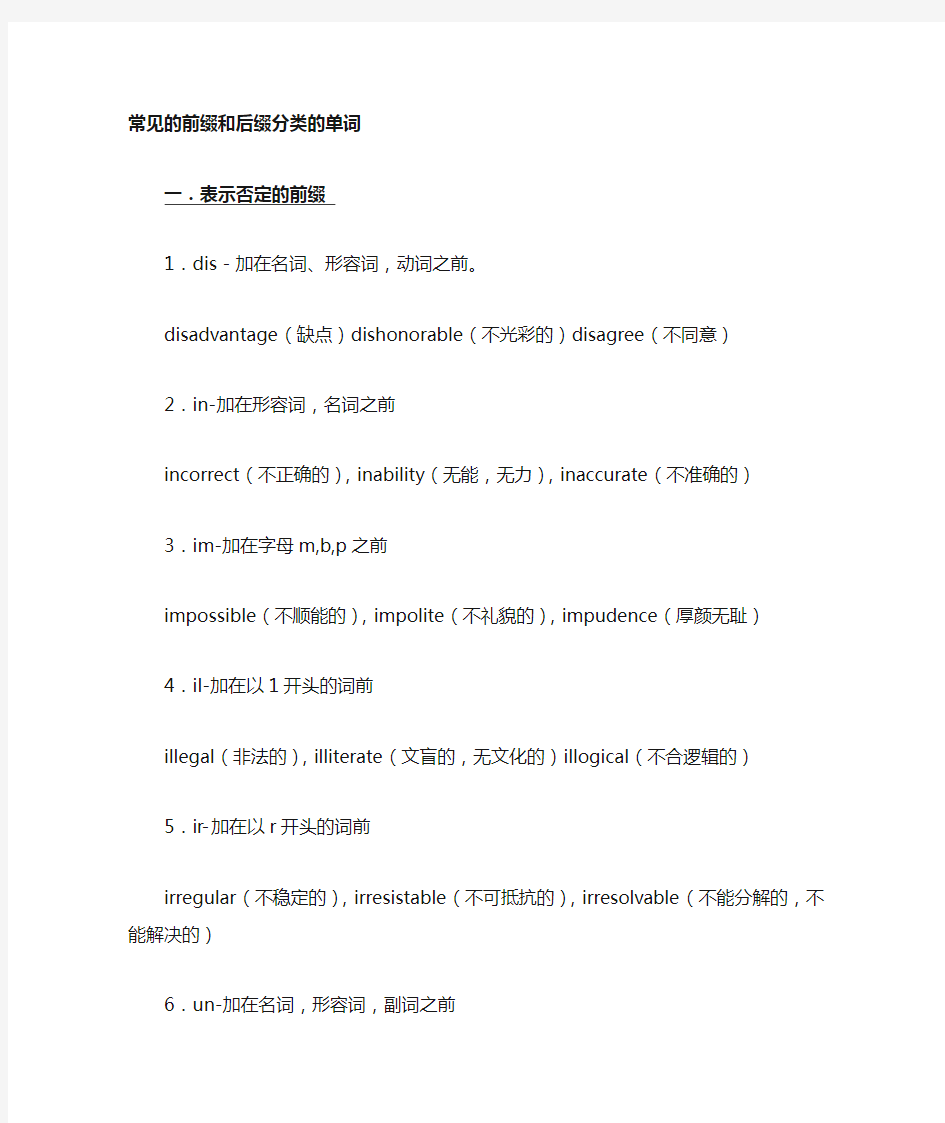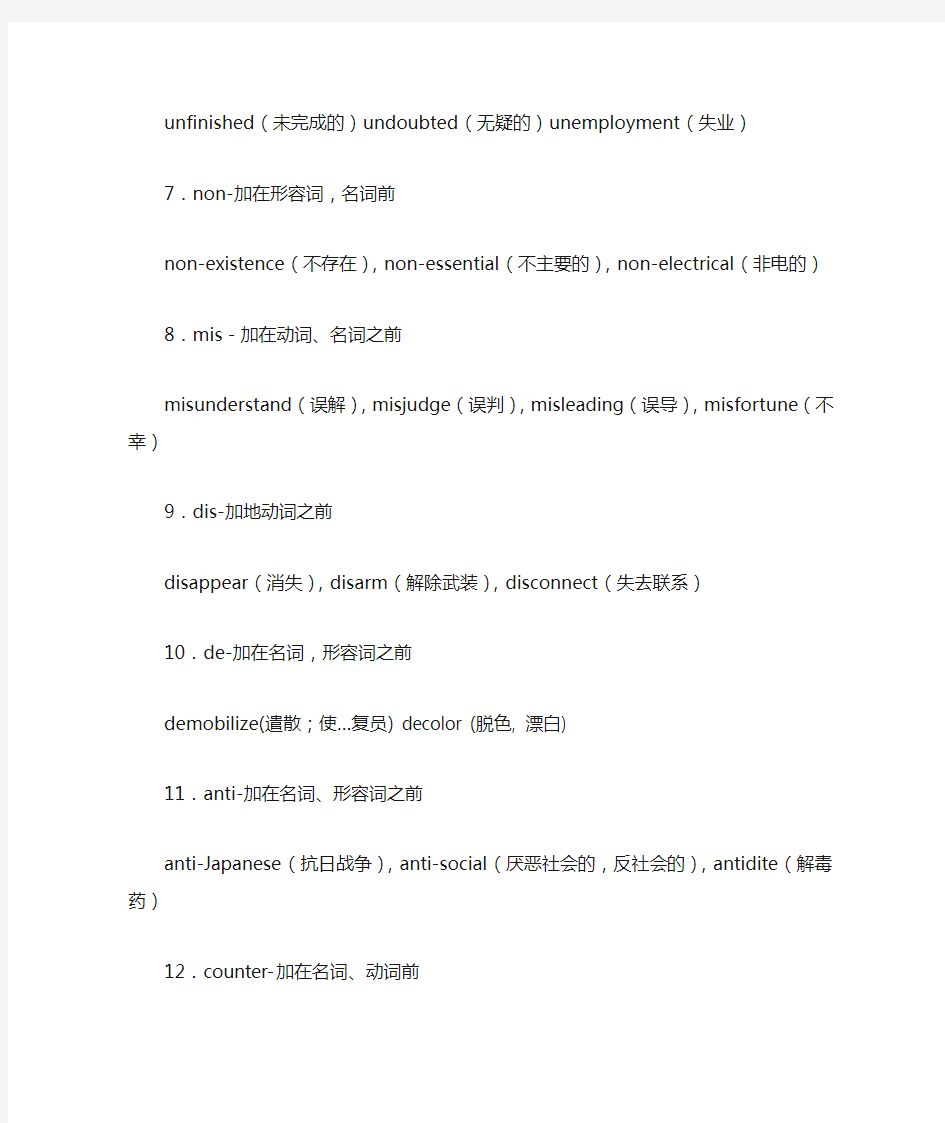前缀和后缀分类


常见的前缀和后缀分类的单词
一.表示否定的前缀
1.dis-加在名词、形容词,动词之前。
disadvantage(缺点)dishonorable(不光彩的)disagree(不同意)
2.in-加在形容词,名词之前
incorrect(不正确的),inability(无能,无力),inaccurate(不准确的)3.im-加在字母m,b,p之前
impossible(不顺能的),impolite(不礼貌的),impudence(厚颜无耻)4.il-加在以1开头的词前
illegal(非法的),illiterate(文盲的,无文化的)illogical(不合逻辑的)5.ir-加在以r开头的词前
irregular(不稳定的),irresistable(不可抵抗的),irresolvable(不能分解的,不能解决的)
6.un-加在名词,形容词,副词之前
unfinished(未完成的)undoubted(无疑的)unemployment(失业)7.non-加在形容词,名词前
non-existence(不存在),non-essential(不主要的),non-electrical(非电的)
8.mis-加在动词、名词之前
misunderstand(误解),misjudge(误判),misleading(误导),misfortune (不幸)
9.dis-加地动词之前
disappear(消失),disarm(解除武装),disconnect(失去联系)10.de-加在名词,形容词之前
demobilize(遣散;使…复员) decolor (脱色, 漂白)
11.anti-加在名词、形容词之前
anti-Japanese(抗日战争),anti-social(厌恶社会的,反社会的),antidite (解毒药)
12.counter-加在名词、动词前
counterattack(反攻,反击),counteract(抵抗,阻碍)counterrevolution (反革命)
二.表示“前before”的前缀
1.pre-
preconception(成见),pre-exsiting(先于……而存在的),pre-selection (选举前的)preface(前言)
2.Ante-
anteroom(前室,接待室),antecessor(先行者,先驱者)
3.Fore-
forehaed(前额),foreground(前景),foreman(工头,领班),foresee (预见,先见),foretell(预言)
4.Pro-
programme(计划),prologue(序幕)
5.Ex-
ex-president(前任总统)ex-wife(前妻)
三.表示“后-post”的前缀
1.post-
post-war(战后),post-position(后置词),postmeridian(下午)
四.表示“低”、“下”的前缀
1.Hypo-
Hypocrisy(伪善,虚伪),hypothesis(假设),pypocholoride(次氯酸盐)2.Infra-
Infra-red(红外线),infrahuman(低于人类的),infrasonic(亚声的,次声的)
3.Sub-
Sub-editou(副编辑),sub-way(地铁),sub-conscious(下意识的),submarine (海下的),subtropical(亚热带的),subtitle(副标题)
五.表示“回”、“再次”、“向后”的前缀
1.Re-
Refuel(给…加油),retranslate(再译),reinforce(加强),reconstruct (重建),return(返回)
2.Retro-
Retrograde(倒退的),retrospect(回顾)
六.表示“共同”、“和”的前缀
1.Co-
co-exist(共存),co-operate(合作),co-education(男女同校)
七.表示“相互”、“之间”的前缀
1.Inter-
Interchangeble(可互换的),interdipendert(互相依靠的),international (国际的),inter-national(交往)
八. 表示“出”、“超出”的前缀
1.Ec-
Eclipse(蚀),ecstasy(狂想)
2.Extra-
Extraordinary(非凡的),extramural(校外的),extrasensory(超感觉的)
九.表示“超过”的前缀
1.hyper-, preter-, super-, sur-, ultra-
hyper-sensitive(过敏的),preterhuman(超人的)
十.其它的前缀
1.auto-自
automatic(自动的),auto-autobilgraphy(自传)
2.mal-坏,恶
Malnutrition(营养不良),maltreat(虐待)
3.Micro-
Microscope(显微镜),microtome(切片机)
4.Tele-远
Telegram(电报),telephone(电话),telescope(望远镜)
5.Demi-,semi-hemi-
Semi-circle(半圆),hemisphere(半球),demilune(半月,新月)6.Uni-, mono-(单一, 单独)
Monotone(单调),monologue(独白),uniform(制服)
7.Bi-,di-二
Biyearly(二年一次的),biweekly(二周一次的),dichloride(二氯化物)8.Tri-三
Triangle(三角),tripld(三角架)
9.Multi-多
multi-colored(颜色多样的),multi-national(多国的)
10.Poly –多
Polygon(多角形),polytomic(多原子的)
11.Arch-首领
archbishop(大主教),architect(建筑师)
12.bene-善,好
benefit(利益),benevolence(善意)
13.homo-同
homosexual(同性恋的),homograph(同形异义字)
14.neo新
neo-colonialism(新殖民主义),neolithic(新石器时代的)
15.ortho-正确,直
orthogonal(直角的),orthodox(正统)
16.philo-挚爱
philosopher(哲学家)
17.proto-原始
protohydrogen(初氢),prototype(原型),protoplasm(原生质)18.pseudo-假的, 伪的, 冒充的
pseudonym(匿名),pseudo-communism(假共产主义)
19.a-,ab-,abs-(只有在t,c之前)从,自
avoid(避免),absent(缺少的),abstain(抑制),abstract(吸引)20.Apo-,aph-来自
apology(道歉,谢罪),apostle(倡言者,先驱)
21.se-分离
separation(分开),secure(安全的),sedition(煽动叛乱)
22.para-防
parachute(降落伞),
23.omni-所有的,公共的
omnibus(公共汽车),omnipotence(万能)
24.pan-全,泛
Pan-American(全美的),pancean(万灵药),panorama(风景的全貌;
万花筒)
25.panto-全
pantisocracy(乌托邦大同世界),pantoscopic(视野广大)
26.dia-通过,借以
diagonal(对角的),diagnosis(诊断),dialogue(对话)
27.Per-通过,彻底,不利
perambrlate(走来走去),perfect极好的
28.trans-通过,横过
transcript(抄本, 副本; 记录),translation(翻译),trxnsparent(透明的),transport(运输),trans-plant(移植)
29.Com-,con-,cor-,col-共同,和,完全
comment(评论),compile(编辑),correlation(相互关系),collect(收集),corruption(贪污腐败),collaborate(合作,合著)
30.syn-共同
synonym(同义词),synchronization(同步),syntonic(谐振的),synthetic (人工的,合成的)
31.meta-和,在……之后
metaphor(比喻),metaphysics(形而上学)
32.Cis-在这一边
cisatlantic(大西洋这边的)
33.pen-几乎,相近
peninsular(.住在半岛上的居民,半岛(状)的, 形成半岛的)
34.en-,em-往……里,使……
encamp(扎营),enable(使……能),endear(使……受喜爱),embrace(拥抱,抓住(机会))
35.intro内在
intracardiac(心脏内部的),intramolecular(分子内部的),intracelular(细胞内部的)
36.intro-到……中
introduce(介绍),introspect(反省,内省)
37.dys-坏
dyspepsia(消化不良),dysentry(痢疾)
38.Eu-优,美好
eulogy(颂词),euphony(悦耳的声音)
39.ambi-,amphi-两者
amphibian(两栖的),ambidextrous(两只手都很灵巧的;心怀二意的;非常灵巧的)
40.penta-五
pentagon(五角大楼),pentagram(五角星),pentameter(五步诗句)41.sex-六
sexangle(六角),sexennial(六年一度的)
42.sept-七
September九月(古罗马的七月),septennial(七年一度)
43.hepta-七
heptab(七个成套之物),heptagon(七角形)
44.octa-,octo,oct八
octagon(八角形),octuple(八倍)October (十月)
45.nona-,ennea-九
nonagon(九角形),ennead(九个一组)
46.deci-,deca-十
decimal(十进位的),decagramme(十克)
47.centi-百
centimeter(厘米),centipede(蜈蚣)
48.milli-千
millenias(千年的),millimeter(毫米)
49.Kilo-千
kilowatt(千瓦),kilometer(千米)
1.-ster,-eer,-er(or)意为:从事某种职业或参与某种活动的人(person engaged in an occupation or activity)例词:gamester,gangster,songster,engineer,profiteer,mountaineer,auctioneer,driver,teacher,director,actor,professor 2.-let意为:小或者不重要的东西(small,unimportant things)例词:booklet,leaflet,starlet
3.-ette意为:1)小的东西(small)例词:cigarette 2)假的东西(imitation)例词:leatherette 3)女性(female)例词:usherette
4.-ess意为:女性(female)例词:actress,poetess,hostess,paintress 5.-hood意为:时期(status;etc.)例词:boyhood,childhood,manhood 6.-ship意为:才能,状态,资格,品质等(skill,state,condition,status,quality)例词:leadership,friendship,membership,lectureship,sportsmanship 7.-ful意为:量(the amount which noun contains)例词:cupful,handful,mouthful,spoonful
8.-tion,-ion意为:1)状态,行动等(state;action;etc.)例词:action,oppression,possession,education,starva- tion 2)机构等(institution;etc.)例词:organization,foundation
9.-ment意为:状态,行动等(state;action;etc.)例词:movement,enslavement,pavement
10.-al意为:动作(action)例词:arrival,refusal,revival,recital,removal 11.-age意为:程度,数量等(extent;amount;etc.)例词:wastage,coverage,acreage,shrinkage,breakage,hostage
12.-ness;-ity(ty)意为:状态,品质(state;quality;etc.)例词:happiness,usefulness,selfishness,kindness,rapidity,activity,sanity,changeability 13.-ism意为:道义,主义,学说等(doctrine of,practice of)例词:idealism,impressionism,absenteeism,racism
二、动词后缀
常见的此类后缀及其具体含义如下:
1.-ify意为:转为,变为(to turn into,to make or become)例词:beautify,diversify,simplify
2.-ize;-en意为:使……,变得……(to make or become ;to make into)例词:modernize,popularize,legalize,hospitalize,symbolize,ripen,widen,heighten,threaten
3.-ate意为:增加,使……(give or add,make or become)例词:originate,hydrogenate,validate,differentiate
三、形容词后缀:
常见的此类后缀及其具体含义如下:
1.-ful意为:充满,有(full of;hav- ing;giving;etc.)例词:useful,pitiful,hopeful,helpful,forgetful,thankful,fearful
2.-less意为:没有,无(without;not giving)例词:speechless,childless,harmless,hopeless,meaningless
3.-ly意为:有……品质的(having the qualities of)例词:beastly,manly,brotherly,friendly
4.-like意为:像……的(like)例词:childlike,statesmanlike,tiger-like 5.-y;-ish意为:像……一般的(somewhat like)例词:meaty,sandy,silky,hairy,leafy,watery,foolish,girlish,blackish,thinnish
6.-some意为:像……一样的;引起……的;有……品质的(like;causing;having the quality of)例词:troublesome,burdensome,wholesome,tiresome,bothersome
7.-able(ible)意为:能……的;可以……的(able to be ;capable)例词:changeable,readable,drinkable,comfortable,expansible,convincible 8.-ed意为:有……的(having,etc.)例词:wooded,pointed,moneyed,odd-shaped
9.-al意为:有……属性的,……类型的(nature of,typical of)例词:cultural,personal,regional,musical
10.-ary(ory)意为:属于……的,与……相连的(belonging to;connected with)例词:revolutionary,imaginary,contradictory
11.-ous意为:富含……的;有……品质的;像……的(full of;having the quality of;like)例词:glorious,erroneous,malicious,gracious
12.-ic(ical)意为:……类的;属于……的(typical of;belonging to)例词:historic,historical,methodic,methodical,dramatic,heroic
13.-ive意为:有……属性的;有某种倾向的(having the nature or quality of;given or tending to)例词:attractive,talkative,restrictive,defensive,preventive,constructive,sensitive
四、副词后缀
常见的此类后缀及其具体含义如下:
1.-ly意为:以……方式(in a...manner;etc.)
例词:happily,boldly,attentive- ly,strangely
2.-ward(s)意为:表示方式或动作的方向(manner and direction of movement)例词:onward(s),backward(s),earthward(s),homeward (s),eastward(s)
3.-wise意为:1)按照……方式(in the manner of)例词:crabwise,clockwise2)就……而言(as
far as ...is concerned)例词:weatherwise ,educationwise
有一个原因的单音节词,结尾只有一个单音辅音,在加以元音后缀是,要双写这个辅音.例词:run + er = runner hit + ing = hitting
(完整版)常用前缀后缀
常用前缀后缀 一.表示否定的前缀 1.dis-加在名词、形容词,动词之前。 disadvantage(缺点)dishonorable(不光彩的)disagree(不同意) 2.in-加在形容词,名词之前 incorrect(不正确的),inability(无能,无力),inaccurate(不准确的) 3.im-加在字母m,b,p之前 impossible(不顺能的),impolite(不礼貌的),impudence(厚颜无耻) 4.il-加在以1开头的词前 illegal(非法的),illiterate(文盲的,无文化的)illogical(不合逻辑的) 5.ir-加在以r开头的词前 irregular(不稳定的),irresistable(不可抵抗的),irresolvable(不能分解的,不能解决的) 6.un-加在名词,形容词,副词之前 unfinished(未完成的)undoubted(无疑的)unemployment(失业) 7.non-加在形容词,名词前 non-existence(不存在),non-essential(不主要的),non-electrical(非电的) 8.mis-加在动词、名词之前 misunderstand(误解),misjudge(误判),misleading(误导),misfortune(不幸) 9.de-加在名词,形容词之前 demobilize(遣散;使…复员) decolor (脱色, 漂白) 10.anti-加在名词、形容词之前 anti-Japanese(抗日战争),anti-social(厌恶社会的,反社会的),antidite(解毒药) 11.counter-加在名词、动词前 counterattack(反攻,反击),counteract(抵抗,阻碍)counterrevolution(反革命) 二.表示“前before”的前缀 1.pre- preconception(成见),pre-exsiting(先于……而存在的),pre-selection(选举前的) preface(前言) 2.ante- anteroom(前室,接待室),antecessor(先行者,先驱者) 3.fore- forehaed(前额),foreground(前景),foreman(工头,领班),foresee(预见,先见),foretell(预言) 4.pro- programme(计划),prologue(序幕) 5.ex- ex-president(前任总统)ex-wife(前妻) 三.表示“后-post”的前缀 1.post- post-war(战后),post-position(后置词),postmeridian(下午) 四.表示“低”、“下”的前缀 1.hypo- hypocrisy(伪善,虚伪),hypothesis(假设),pypocholoride(次氯酸盐) 2.Infra- infra-red(红外线),infrahuman(低于人类的),infrasonic(亚声的,次声的) 3.sub- sub-editou(副编辑),sub-way(地铁),sub-conscious(下意识的),submarine(海下的),subtropical(亚热带的),subtitle(副标题)
最常见的前缀和后缀
英语中的派生词的构成主要有三种:合成(由两个或两个以上的单词合成的单词);派生(指一个词根加上前缀或后缀构成的单词);转化(一种词性转化成另一种或几种词性的单词)。本文重点通过对前缀和后缀的剖析解读派生词的意义和特点。 先看下表: 一、前缀 1. dis- 表示意义相反,主要用在动词之前,间或用于名词或形容词前。如: appear (v.出现) → disappear (v.消失), 再如: dislike不喜欢 discover 发现 disobey不遵从 disbelieve 不相信 dishonest(adj.)不诚实的 disadvantage (n.) 不利条件,缺点 2. in-, im-, un-, il-, ir-用在形容词前,表示否定意义。如: indirect 间接的 incorrect 不正确的 inactive 不活动的
impossible 不可能的 unable 不能的 unhealthy 不健康的 unsuccessful 不成功的 uncommon不普通的 unpleasant令人不快的 unfortunate不幸的 irregular不规则的 illegal非法的 invisible看不见的 3. re- 表示“重新,再”,用在动词前。如: rebuild 重新建造 recycle 再循环 reconsider 重新考虑 review 复习二、后缀 I.形容词后缀 1. -able (n./v.→adj.)表示“可以……的;显示……性质”。如:respectable 可敬的 eatable 可吃的 comfortable 舒服的 valuable 有价值的 fashionable 时髦的 loveable 可爱的 2. -ful (n./v.→adj.) 表示“充满……的”。如: beautiful 漂亮的 successful 成功的 wonderful 精彩的 mouthful 满嘴的 shameful 可耻的 hopeful 充满希望的 3. -less (n.→adj.) 表示“没有……的”。如: jobless 无业的 cordless 无线的 homeless 无家可归的 helpless 无助的 4. -ous (n.→adj.)表示“具有……性质的”。如: nervous 紧张的 famous 著名的 dangerous 危险的 poisonous 有毒的 mountainous 山区的 humorous 幽默的
英语常见前缀后缀68189
英语常见前缀后缀 68189 -CAL-FENGHAI.-(YICAI)-Company One1
前缀 1 a- 加在单词或词根前面, 表示不,无,非 2 a- 加在单词前, 表示在... ..的 3 ab-, abs- 加在词根前,表示离去,相反,变坏等 4 ab-, ac-, ad-, af-, ag-, an-, ap-, ar-, as-, at- 等加在同辅音字母词根前,表示一再等加强意 5 ad- 加在单词或词根前, 表示做....., 加强...... 6 amphi- 表示两个、两种 7 an- 在词根前, 表示不,无 8 ana- 表示错误,在旁边,分开 9 ante- 表示前面,先 10 anti- 表示反对,相反 11 apo- 表示离开,远离 12 auto- 表示自动、自已 13 be- 构成动词,表示使......成为 14 be- 构成一些介词 15 bene- 表示善, 好 16 bi- 表示二个, 两 17 by- 表示在旁边,副的 18 cata- 表示向下,相反,离开 19 circum- 表示环绕,周围 20 co- 表示共同,通常放元音词根前 21 col-, cor- 在同辅音词根前, 表示共同 22 com-, con- 表示共同 23 contra - 表示反对,相反 24 counter - 表示反对,相反 25 de- 表示去掉,变坏,离开,变慢,向下等 26 de- 表示使....成为,加强等 27 deca- 表示十 28 deci- 表示十分之一 29 demi- 表示半 30 di- 表示二个,双 31 di- 表示使...变成,分开,离开
构词法-常用英语前缀后缀大全
学点构词法(对扩大词汇量很有帮助喔^^加油) 一. 常见的前缀 1.表示否定意义的前缀 1)纯否定前缀 a-, an-, asymmetry(不对称)anhydrous(无水的) dis-, dishonest, dislike in-, ig-, il-, im-, ir-, incapable(无能力的、不胜任的), inability(无能), ignoble(平民的、卑贱的), impossible, immoral(不道德的), illegal(非法的、非法移民), irregular(不规则的、不合法的) ne-, n-, none, neither, never non-, nonsense neg-, neglect(忽略) un- unable, unemployment(失业) 2)表示错误的意义 male-, mal-, malfunction(故障、发生故障的), maladjustment(失调) mis-, mistake, mislead(误导) pseudo-, pseudonym(假名), pseudoscience(伪科学) 3)表示反动作的意思 de-, defend(防护、防守、辩护), demodulation(解调) dis-, disarm(裁军、解除武装、缓和), disconnect(使分开,拆开) un-, unload, uncover 4)表示相反,相互对立意思 anti-, ant-, antiknock(防震), antiforeign,(排外的) contra-, contre-, contro-, contradiction(矛盾、不一致), contraflow(逆流) counter-, counterreaction(逆反应), counterbalance(平衡、使抵消) ob-, oc-, of-, op-, object, oppose, occupy with-, withdraw(撤回、撤退), withstand(对抗) 2. 表示空间位置,方向关系的前缀 1)a- 表示“在……之上”,“向……” aboard, aside, 2)by- 表示“附近,邻近,边侧” Bypath(侧道), bypass(弯路) 3)circum-, circu-, 表示“周围,环绕,回转” Circumstance(环境), circuit(巡回、绕路) 4)de-, 表示“在下,向下” Descend(下降、突然拜访), degrade(降格,使屈辱) 5)en-, 表示“在内,进入” Encage(把……关起来) 6)ex-, ec-, es-, 表示“外部,外” Exit(出口、离去), eclipse(使……黯然失色), expand(扩张), export(出口) 7)extra-, 表示“额外”
常见的前后缀和词根介绍
常见的单词前缀和后缀—归纳总结 前缀没有特别重要的含义,配合词根来表达单词的含义,常用的如下(由熟悉的一个老单词,来学习一个你必须掌握的新的前缀,将原来对于某一个单词认识升华到理性认识)。 分:dis-(常指一分为多),se-(常指一分为二); 举例:display展览,陈列(dis-分着,play-播放、展示,分着展示——展览,陈列)separate分开(se-分,par=pair-一对、一双,ate-动词后缀——把一对儿分开——分开,隔离) 前:pre-(在…之前),pro-(往…前); 举例:preface封面(pre-前,face-脸、面,在前面的脸——封面) progress前进,进步(pro-往前,gress-前进,往前前进——前进,进步) 上:sur-(超,过);举例:surpass超过,超越(sur-超,pass过——超过、超越) 下:sub-(常指往...下),de-(常指在...下); 举例:subway地下铁、地道(sub-下面,way-路,下面的路——地下铁) delay延迟、耽误(de-底下,lay-放,往底下放——延迟,耽误) 不:a-,ab-,un-,dis-,im-(还有in/il/ir的版本); 举例:abound丰富,大量(a-不,bound-板子,边界——无边无界、一望无垠,丰富,富饶)about关注、关于、大约(ab-不,out-出去、离开,不出去,不离开——关注、关于、大约)unhappy不高兴(un-不,happy-高兴——不高兴) dislike不喜欢(dis-不,like-喜欢——不喜欢) immediately立即地,直接地(im-不要,med-中间、中间环节,iately-复合的后缀,不要中间环节、一步到位——立即地,直接的) incorrect不正确的(in-不,correct-正确的——不正确的) illegal不合法的(il-不,leg-词根:law,al-的——非法的) irregular不规则的(ir-不,regular-规则的) 内:ac-(常指往...里),in-(常指在...里,也有im/il的版本); 举例:accept接受(ac-往里,cept-拿、取,往里面拿——接受) inside在里面(in-在里,side-边、侧) import进口(im-进入,port-港口) illuminate照明(il-进入,lumin-词根:光,ate-动词后缀,进入灯光——照明) 共:com-(还有con/cor/col的版本),per-(具体指:“每一个”或者“一直”的意思); 举例:compose组成,构成(com-共同,pose-摆放,往共同的地方摆放——组成、构成) connect联系(con-共同,nect=neck-脖子,相同的脖子,拥有同一个脖子的——连接、联系) correct正确的(cor-全都,rect-直立、直立着,全都是直立的——正确的) collect收集,收藏(col-全都,lect-挑选,全挑过来,全选过来——收集、收藏、集中) person人(per-每一个,son-儿子,人是上帝的每一个儿子,每个人也都是上帝之子) perfect完美的(per-每一个,fect-做,制造,每一件事都做了——完美的) 外:ex-,e-,es-; 举例:exit出口、门(ex-往外,it-后缀,往外出的地方——出口、门) elect选举(e-往外,lect-挑选,往外挑选出来——选举) essay散文、随笔(es-往外,say-说,随口而说——散文,随笔) 反:re-(有反复、返回两个意思),op-(相对的); 举例:return返回(re-往回,turn-转,往回转——返回) oppose对抗(op-相对,pose-摆放——在相对的位置摆放——对抗) 难点两处: 1,dis/ab/re-三个前缀是难点,各有两种含义,要重点强化。
常用的前缀和后缀
一、常用的前缀和后缀 1、常用前缀 aero-:concerning the air of aircraft plane—aeroplane space—aerospace anti-:against;opposite of nuclear—antinuclear matter—antimatter war—antiwar auto-:of or by oneself biography—autobiography criticism—autocriticism be-:to treat as the stated thing friend—befriend little—belittle bi-:two;twice;double lingual—bilingual cycle—bicycle bio-:concerning living things chemistry—biochemistry sphere—biosphere by-,bye-:less important produce—by-produce way—byway centi-:hundredth part grade—centigrade meter—centimeter co-:together,with author—coauthor exist—coexist col-:( used before l ) together,with location—collocation com-:( used before b,m,p ) together,with
passion—compassion con-:together,with centric—concentric federation—confederation contra-:opposite diction—contradiction natural—contranatural cor-:( used before r ) together,with relate—correlate respond—correspond counter-:opposite act—counteract attack—counterattack cross-:across;going between the stated things and joining them country—crosscountry breed—crossbreed de-:showing an opposite;to remove;to reduce code—decode value—devalue dis-:not;the opposite of advantage—disadvantage agree—disagree honest—dishonest em-:( used before b,m,p ) to cause to become body—embody power—empower en-:to cause to become;to make danger—endanger large—enlarge ex-:former ( and still living ) minister—ex-minister wife—ex-wife
英语中常用的前缀和后缀
英语中常用的前缀和后缀 aero:concerning the air or aircraft plane(飞机)—aeroplane(飞机) space(空间, 间隔)—aerospace(航空宇宙) anti: against;opposite of nuclear([核]核子的)—antinuclear(反对使用核武器的) matter(物质)—antimatter(反物质) war(战争、作战、打仗)—antiwar(反战的, 反对战争的) auto: of or by oneself biography(传记)—autobiography(自传) criticism(批评, 批判)—autocriticism(自我反省, 自我检讨) be:to treat as the stated thing friend(朋友, 助手)—befriend(待人如友, 帮助) little(很少的, 矮小的,很少)—belittle(轻视, 使渺小, 使...显得渺小)bi: two;twice;double lingual(语言的)—bilingual(能说两种语言的) cycle(自行车)—bicycle(脚踏车, 自行车) bio:concerning living things chemistry(化学)—biochemistry(生物化学) sphere(圈子)—biosphere(生物圈) by—:less important product(产品, 产物,)—by-product(副产品, 附加产物) way(路,道路)—byway(小道) centi: hundredth part grade(等级)—centigrade(分为百度的, 百分度的, 摄氏温度的)meter(米)—centimeter(厘米) co: together, with author(作家, 创造者)—coauthor(合著者, 共同执笔者,合著)exist(存在, 生存)—coexist(共存) col:(used before l) together, with location(位置, 场所)—collocation(排列, 配置) com:(used before b, m, p)together, with passion(激情, 热情)—compassion(同情,怜悯)
常见的前后缀
常见得前缀 一、表示否定意义得前缀 un-不做相反动作dis-不做相反动作in- 不 im-不ir-不il- 不non- 不,非 【猜一猜】①unhappy ②untrue ③undress④undo⑤disagree(ment)⑥disown ⑦disinect ⑧non-existent⑨non-conductor 【key】①不高兴②不真实③暴露,使卸去装饰④解开,松开⑤不一致,不适合(争执,争论) ⑥否认⑦消毒⑧不存在得⑨绝缘体 二、表示前,先前意义得前缀 husband ex—husband(前夫) see oresee(预知,预见) history prehistory(史前时期) claim proclaim(宣告,宣布) 瞧完这单词得对比大家一定知道这一组前缀主要就是表示前,先前,预先 前缀ex-,汉语意思就是“先前",它主要就是与表示“人”得名词搭配、 例如:ex—minister-ormerminister(前任大使) 前缀ore-,汉语意思就是“先前得”、“在前面得”,它可以加在某些动词与名词前面。例如:oretell预言前缀pre—,汉语意思就是“在……前”,它主要就是加在名词前面,也与少量得形容词、动词搭配、 前缀pro—,汉语意思就是“向前,在前,预先”,可以与名词、动词、形容词搭配。 例如:propelling(向前推进得) 【猜一猜】①ex-president ②orecast ③orecourt④orehead ⑤oreground⑥preadult ⑦preannounce ⑧precook ⑨preace 【key】①前任总统②预见,预测③前院,(篮球)前(场)球④前额,(任何事物得)前部⑤前景,最显著得位置⑥成年前得⑦预告,事先宣告⑧预煮,预先烹调(食物)⑨前言 三、表示错误得,不良意义得前缀 spell misspell拼错 treat maltreat虐待,滥用 根据前面单词得比较我们能得出 mis—错误地mal-不良得 【猜一猜】①misinorm ②malunction 【key】①告诉错误得消息②故障 四、表示空间位置、方向关系得前缀 请大家熟记下面得顺口溜里in(im,inter, intro)外out。上over(super,up)下sub(under)、前pro(pre)后po st。还有中间就是medi(med,mid)、 前缀意义例词 in—,im-表示“向内,在内,背于”inside里面;import进口 inter-,intel—表示“在……间,相互”international国际得;internet互联网 intro-表示“向内,在内,内侧”introduce介绍 en—表示“在内,进入”encage 关在笼中,把…关起来 out—表示“在上面,在外部,在外”outline 大纲,轮廓,略图;outside外面 ex-,ec—,es-表示“外部,外”exit,出口;expand 扩张,张开,发展 extra- 表示“额外”extraction提取 up—表示“向上,向上面,在上”upward在上面地,向上地;uphold 支持,
最常见的前缀和后缀
1 / 5 英语中的派生词的构成主要有三种: 合成(由两个或两个以上的单词合成的单词);派生(指一个词根加上前缀或后缀构成的单词);转化(一种词性转化成另一种或几种词性的单词)。本文重点通过对前缀和后缀的剖析解读派生词的意义和特点。 先看下表: 词缀 特点 类别前缀通常不改 变词性词义词类 agree (v.)→ disagree(v.) 同意→不同意 health (n.)→ healthy (adj.) 健康→健康的 care (n.)→ careless (adj.) 小心→粗心的 意义改变后缀一般改变 2 / 5 词性词义改变不 大, 但否定意义后
缀除外 一、前缀 1. dis-表示意义相反,主要用在动词之前,间或用于名词或形容词前。如: appear (v.出现) →disappear (v.消失), 再如: dislike不喜欢discover发现disobey不遵从disbelieve不相信dishonest(adj.)不诚实的disadvantage (n.)不利条件,缺点2. in-, im-, un-, il-, ir-用在形容词前,表示否定意义。如:indirect间接的incorrect不正确的inactive不活动的impossible不可能的unable不能的unhealthy不健康的unfortunate不幸的irregular不规则的illegal非法的 invisible看不见的 3. re-表示“重新,再”,用在动词前。如: rebuild重新建造recycle再循环reconsider重新考虑review复习二、后缀 I.形容词后缀 1. -able (n./v.→adj.)表示“可以??的;显示??性质”。如:valuable有价值的fashionable时髦的loveable可爱的 3 / 5 2. -ful (n./v.→adj.) 表示“充满??的”。如: beautiful漂亮的successful成功的wonderful精彩的 mouthful满嘴的shameful可耻的hopeful充满希望的
常用前缀和后缀
专升本常用前缀和后缀 1.常用前缀 aero:concerning the air or aircraft plane(飞机)—aeroplane(飞机) space(空间, 间隔)—aerospace(航空宇宙) anti: against;opposite of nuclear([核]核子的)—antinuclear(反对使用核武器的) matter(物质)—antimatter(反物质) war(战争、作战、打仗)—antiwar(反战的, 反对战争的) auto: of or by oneself biography(传记)—autobiography(自传) criticism(批评, 批判)—autocriticism(自我反省, 自我检讨) be:to treat as the stated thing friend(朋友, 助手)—befriend(待人如友, 帮助) little(很少的, 矮小的,很少)—belittle(轻视, 使渺小, 使...显得渺小)bi: two;twice;double lingual(语言的)—bilingual(能说两种语言的) cycle(自行车)—bicycle(脚踏车, 自行车) bio:concerning living things chemistry(化学)—biochemistry(生物化学) sphere(圈子)—biosphere(生物圈) by—:less important product(产品, 产物,)—by-product(副产品, 附加产物) way(路,道路)—byway(小道) centi: hundredth part grade(等级)—centigrade(分为百度的, 百分度的, 摄氏温度的) meter(米)—centimeter(厘米) co: together, with author(作家, 创造者)—coauthor(合著者, 共同执笔者,合著) exist(存在, 生存)—coexist(共存) col used before l) together, with location(位置, 场所)—collocation(排列, 配置) com used before b, m, p)together, with passion(激情, 热情)—compassion(同情,怜悯) con:together, with centric(中心的, 中央的)—concentric(同中心的) federation(同盟, 联邦, 联合, 联盟)—confederation(联邦) contra pposite diction(措辞, 用语, 言语)—contradiction(反驳, 矛盾)
英语单词常见的前缀和后缀及例词
英语单词常见的前缀和后缀 (1)前缀 ①表示“数量” hemi- hemisphere 半球 semi- semicircle 半圆 mono- monocycle 独轮车 monologue 独白uni- unity 团结 university 综合性大学bi- bicycle 自行车 biweekly 双周刊tri- triangle 三角形 tricycle 三轮车quart- quarter 四分之一 penta- pentagon 五角形 Pentagon 五角大楼cent- century 一百年 percent 百分比kilo- kilometer 千米 kilogram 千克multi- multifunctiona 多功能的 multi-national 多国的pan- Pan-American 泛美的 ②表示“否定” de- decrease 减少 destruction 破坏dis- dishonest 不诚实 disappear 消失in- informal 非正式的 innumerable 无数的mis- mistreat 虐待 mistrust 不信任un- unfriendly 不友好的 unlock 开锁non- nonstop 直达的 nonexistent 不存在的 ③表示“方向,位置” ex- exple 赶出 extract 抽出in- indoor 户内的 include 包括
inter- interview 会见 interact 互相作用 pro- propel 推进 protrude 向前伸出sub- subway 地下铁道 submarine 潜艇 trans- transatlantic 横穿大西洋的 transform 变革 ④表示“程度” extra(o)- extraordinary 非常的 extracurricular 课外的 mini- minibus 小面包车 miniskirt 短裙 out- outnumber 数量超过 outlive 活得更长over- overwork 过度劳累 overcharge 要价过高super- supersonic 超音速 supermarket 超级市场under- underestimate 低估 underdeveloped 不发达的 ⑤表示“时间先后” ex- ex-premier 前总理 ex-husband 前夫 fore- forehead 前额 foresee 预见 mid- midday 正午 midterm 期中 pre- precaution 预防措施 prefix 前缀 post- postpone 推迟 postwar 战后 ⑥表示“方式” anti- antinuclear 反核 antiaircraft 防空 co- coexist 共存 colleague 同事 col- collaborate 合作 collocate 并置 com- compassion 同情 combine 联合
常见前缀和后缀
考研英语常见前缀和后缀 掌握一些英语构词法,对单词的记忆和理解有很大的帮助,下面列举一些常用的词缀和词根。 一. 常见的前缀 1.表示否定意义的前缀 1)纯否定前缀 a-, an-: asymmetry(不对称)anhydrous(无水的) dis- : dishonest, dislike in-, ig-, il, im, ir : incapable, inability, ignoble(卑鄙的) impossible, immoral, illegal, irregular(不规则的) ne-, n-: none, neither, never
non-: nonsense neg-: neglect un- unable: unemployment 2)表示错误的意义 male-, mal-: malfunctio(故障)maladjustment(失调) mis-: mistake, mislead pseudo-:假的, pseudonym(假名) pseudoscience(伪科学) 3)表示反动作的意思 de-: defend(辩护)demodulation(解调) dis-: disarm, disconnect un-: unload(卸), uncover(揭露)4)表示相反,相互对立意思
anti-, ant-: antiknock( 防震), antiforeign,(排外的) contra-, contre-, contro-: contradiction, controflow(逆流) counter-: counterreaction(逆反应)counterbalance(平衡力,抵消) ob-, oc-, of-, op-: object, oppose, occupy with-: withdraw(撤退,收回)withstand(抵挡,反抗) 2. 表示空间位置,方向关系的前缀1)a- 表示“在……之上”,“向……”aboard, 在……之上(飞机,船,火车) aside离开,旁边,在……旁边
常见英语前后缀汇总
常见英语前缀 a-/an-==no;without;lack,amateur不熟练的,业余的,anonymous匿名的,asocial不好社交的,anechoic消声的,anharmonic不和谐的,anarchism无政府主义,acentric无中心的,amoral非道德性的,asexual无性别的 a-==in;on;at;by;with;to,asleep在熟睡中,ahead向前,在前头,abreast肩并肩地,aside在一边,abed 在床上,abloom开花 a-/an-==加强意义,aloud高声地,aright正确地,awake唤醒,aweary疲倦的,annotate注释,announce宣布,通告 ab-==from;awayfrom,abnormal不正常的,abroad国外的,abuse滥用,absorb吸去,abaxial离开轴心的,abend异常终止 ac-==at;to,或表示加强意义,accustom使习惯,account计算,算帐,accredit信任,accompany陪伴,acclaim欢呼,喝彩,accomplish完成 ad-==to;toward;forward,advice建议,advocate倡导,adjoin临近adjust调整,admixture混杂,adventure冒险 af-==at;to,或表示加强意义,affright震惊,恐惧,affix附加,贴上,affirm肯定,确实 ag-==at;to,或表示加强意义,aggrandize增大,aggravate加重,aggrieve使悲痛 amphi-==两、双,amphicar水陆两用车,amphibian水陆两栖的,amphitheatre两边都可观看的剧场,圆形剧场 ante-==before,antecedent先前的,先行的,antetype先型,原型,anteport前港,外港,anteroom 前室,接待室,antedate比实际早的日期,antestomach前胃 anti-==against,antipathy反感,antifreeze防冻,antiwar反战的,anti-imperlialist反帝的,antiageing 防衰老的,antitank反坦克 ap-==加强或引伸意义,appoint指定,任命,appraise评价,appease平息,绥靖 ap-/apo-==离开,apogee远地点(远离地球之处),apostasy脱党,叛教,aphelion(天文)远日点 ar-==at;to,或表示加强及引伸意义,arrange安排,布置,arrect直立的,arrear在后,拖延 arch-==1)big;chief.2)ancient,archbishop大主教,archaeology考古学,archaic古体的,古风的as==to;forward,assign派出,assent同意,assort分类,assimilate同化,吸收,assure使确信,担保,associate联合,结合 at-==at;to,或表示加强及引伸意义,attrap使入陷阱,attest证明,attract吸引 auto-==self;personally,automation自动化,autograph亲笔,autoalarm自动报警器,autocriticism自我批评,autorotation自动旋转,autobiography自传 be-==makeorcausetobe,befog使迷糊,befit适宜,belittle贬低,befriend以朋友相待,becalm使镇静,befool欺骗,愚弄 be-==加以...,饰以...,用...(做某事),bepowder在...上撒粉,bejewel饰以珠宝,becloud遮蔽 be-==在,beside在...旁,below在...下面,before在...之前 be-==加强及引伸意义,befall降临,发生,bespatter溅污,belaud大加赞扬 bene-==well;good,benign和善的,benevolent乐善好施的,benefit好处,benediction祝福,benefaction恩惠,善行,beneficent行善的 bi-==two,bicycle自行车,bilateral双方,bimonthly双月刊,biweekly双周刊,bicolor两色的,bilingual两种语言的 by-==旁、侧、非正式、副,byroad小路,僻径,bywork业余工作,byname别名,绰号 circu-==around,circulate流通,circumnavigate环球航行,circumspect考虑周到的,circumplanetary 环绕行星的,circumpolar在两极周围的,circumaviate环球飞行
英语常见前缀后缀
英语单词中常见前缀(prefix)和后缀(suffix)大总结 ★1.表示否定意义的前缀 1) 纯否定前缀 a-, an-, asymmetry(不对称), asexual, amoral dis- dishonest, dislike in-, ig-, il-, im-, ir-, incapable, inability, ignoble, impossible, immoral, illegal, irregular ne-, n-, none, neither, never non-, nonsense neg-, neglect un- unable, unemployment 2)表示错误的意义 male-, mal- malfunction, maladjustment(失调,不适应) mis- mistake, mislead, misunderstanding pseudo- pseudonym(假名), pseudoscience 3)表示相反动作的意思 de- defend , decompose dis- disarm, disconnect un-, unload, uncover 4)表示相反,相互对立意思
anti-, ant- antiknock( 防震), antiforeign,(排外的) contra-, contre-, contro-, contradiction counter-, counterreaction, counterbalance ob-, oc-, of-, op- object, oppose, occupy with- withdraw, withstand ★2. 表示空间位置,方向关系的前缀 1)a- 表示“在……之上”,“向……” aboard, aside, 2)by- 表示“附近,邻近,边侧” bypath, bypass(弯路) 3)circum-, circu-, 表示“周围,环绕,回转” circumstance, circus 4)de-, 表示“在下,向下” descend, degrade 5)en-, 表示“在,进入” encage, encamp 6)ex-, ec-, es-, 表示“外部,外” exit, expand, export 7)extra-, 表示“额外” extraction (提取) 8)fore- 表示“在前面” forehead, foreground
常用的前缀和后缀
常用的前缀和后缀1.常用前缀 aero :concerning the air or aircraft plane(飞机)—aeroplane(飞机) space(空间, 间隔)—aerospace(航空宇宙)anti : against;opposite of nuclear([核]核子的)—antinuclear(反对使用核武器的) matter(物质)—antimatter(反物质) war(战争、作战、打仗)—antiwar(反战的, 反对战争的) auto : of or by oneself biography(传记)—autobiography(自传) criticism(批评, 批判)—autocriticism(自我反省, 自我检讨) be :to treat as the stated thing friend(朋友, 助手)—befriend(待人如友, 帮助) little(很少的, 矮小的,很少)—belittle(轻视, 使渺小, 使...显得渺小) bi : two;twice;double lingual(语言的)—bilingual(能说两种语言的)cycle(自行车)—bicycle(脚踏车, 自行车)bio :concerning living things chemistry(化学)—biochemistry(生物化学)sphere(圈子)—biosphere(生物圈) by—:less important product(产品, 产物,)—by-product(副产品, 附加产物) way(路,道路)—byway(小道) centi : hundredth part grade(等级)—centigrade(分为百度的, 百分度的, 摄氏温度的) meter(米)—centimeter(厘米) co : together, with author(作家, 创造者)—coauthor(合著者, 共同执笔者,合著) exist(存在, 生存)—coexist(共存) col :(used before l) together, with location(位置, 场所)—collocation(排列, 配置) com :(used before b, m, p)together, with passion(激情, 热情)—compassion(同情,怜悯) con :together, with centric(中心的, 中央的)—concentric(同中心的) federation(同盟, 联邦, 联合, 联盟)—confederation(联邦) contra :opposite diction(措辞, 用语, 言语)—contradiction(反驳, 矛盾) natural(自然的, 自然界的)—contranatural(违背自然的) cor :(used before r) together, with relate(叙述, 讲, 使联系, 发生关系)—correlate(使相互关联,和...相关) respond(回答, 响应, 作出反应,有反应)—correspond(符合, 协调, 通信, 相当, 相应)counter :opposite act(担当,表现, 见效)—counteract(抵消, 中和, 阻碍) attack(攻击)—counterattck(反引力) cross :across;going between the stated things and joining them country(乡下的, 乡村的, [方]祖国的, 故乡的)—cross country(越野的, 横过田野的)breed((使)繁殖, 教养, 抚养,品种, 种类)—crossbreed([生物]杂种,异种交配, 培育杂种, (使)杂交) de :showing an opposite; to remove; to reduce code(代码, 密码)—decode(解码, 译解) value(评价, 重视)—devalue((=devaluate)减值, 贬值) dis :not; the opposite of advantage(优势, 有利条件)—disadvantage(不利, 不利条件, 缺点, 劣势) agree(同意)—disagree(不一致, 不适宜) honest(诚实的, 正直的)—dishonest(不诚实的) em :(used before b,m, p) to cause to become
